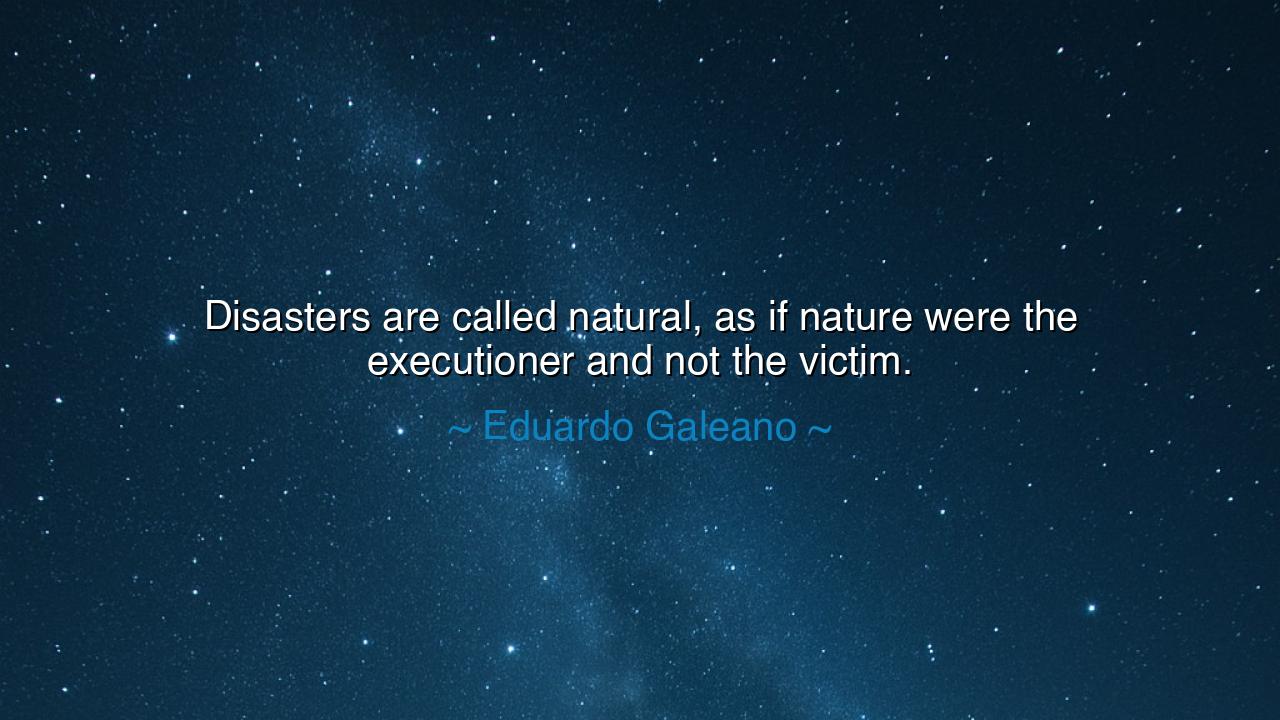
Disasters are called natural, as if nature were the executioner






When Eduardo Galeano wrote, “Disasters are called natural, as if nature were the executioner and not the victim,” he struck at the heart of a grave misunderstanding. With these words, the great Uruguayan storyteller exposed the arrogance of mankind: that we name storms, floods, and famines as natural disasters, as though the earth herself rises against us in fury, when in truth it is often our own hand that has wounded her, and she, like a mother in pain, groans in reply. Galeano shifts the gaze—he asks us to see not nature as the killer, but nature as the one who suffers, bearing the blows of human greed, negligence, and pride.
For centuries men have spoken of earthquakes, hurricanes, and wildfires as acts of nature’s wrath, calling them “acts of God,” as though heaven itself had sharpened a sword. Yet Galeano insists this is not so. The earth is not our enemy, but our companion, our dwelling place, our very flesh. When forests are cut, when rivers are poisoned, when the sky is choked with smoke, can we truly say that the storm that follows is “natural”? No—it is the answer of a wounded world. Nature is not executioner—it is victim.
History offers countless lessons in this truth. Recall the Dust Bowl of the 1930s in the United States. For years, farmers plowed recklessly, stripping the land of its grasses, exhausting its soil with single crops. Then the winds came. Dust rose like a black blizzard, blotting out the sun, choking livestock, driving families from their homes. Many cried that nature had betrayed them. Yet it was not betrayal but consequence: the earth, overworked and unprotected, had collapsed. Humanity had sinned against the land, and the land, unable to bear more, cried out. The disaster was not natural—it was human.
The ancients, too, knew this bond. The Greeks told of Gaia, the earth goddess, who nourished but also groaned when mistreated. Their myths warned that hubris against nature would bring ruin. They understood, as Galeano declares, that when calamity strikes, it is not that nature has turned executioner, but that humanity has forgotten reverence. Disasters, then, are not punishments from outside, but echoes of our own disharmony with the world that sustains us.
Galeano’s words are a call to humility. They remind us that we are not masters above the earth, but children within her embrace. To call disasters “natural” is to wash our hands of guilt, to pretend that the floods were not worsened by deforestation, that the drought was not sharpened by waste, that the hurricane was not strengthened by warming seas. His wisdom urges us to look honestly: our choices, our systems, our appetites have wounded the earth, and her cries shake our cities.
For those who listen, the lesson is clear: we must cease blaming the victim. Let us honor nature as ally, not accuse her as enemy. Let us live with restraint, gratitude, and care. When the earth suffers, we too will suffer, for our lives are interwoven with hers. To ignore this bond is to invite ruin, but to live in harmony with it is to invite renewal.
Practically, we must act: plant where there has been cutting, protect where there has been exploitation, reduce where there has been excess. Teach children not only of history’s kings and wars, but of rivers, forests, and skies that sustain them. Stand against those who plunder the earth for fleeting profit. For if disasters are not truly natural, then their remedy lies not only in prayers, but in choices.
Thus Galeano’s words endure like a mirror held to our time: do not call nature executioner when she is the one bleeding beneath your hand. Remember this, and you will walk not as a destroyer, but as a guardian. And in that guardianship lies hope—for yourself, for your children, and for the earth that is both your mother and your home.






AAdministratorAdministrator
Welcome, honored guests. Please leave a comment, we will respond soon